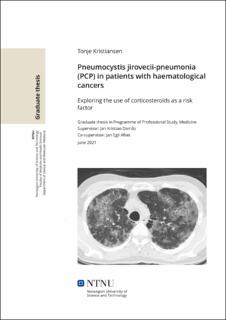| dc.contributor.advisor | Damås, Jan Kristian | |
| dc.contributor.advisor | Afset, Jan Egil (medveileder) | |
| dc.contributor.author | Kristiansen, Tonje | |
| dc.date.accessioned | 2021-10-22T17:20:01Z | |
| dc.date.available | 2021-10-22T17:20:01Z | |
| dc.date.issued | 2021 | |
| dc.identifier | no.ntnu:inspera:71607394:30184984 | |
| dc.identifier.uri | https://hdl.handle.net/11250/2825092 | |
| dc.description.abstract | Innledning: Iatrogen immunsuppresjon har hatt en revolusjonerende påvirkning i behandling av en rekke tilstander, blant annet autoimmune lidelser, kreft og etter organtransplantasjon. Selv om immunsuppressive medikamenter har flere positive effekter, blant annet ved å øke livskvalitet og forventet levealder, bidrar de også til økningen i antall mennesker som lever med økt risiko for å utvikle en sekundær immunsvikt. Opportunistiske infeksjoner, inkludert Pneumocystis jirovecii-pneumoni (PCP), kan være et uheldig resultat av immunsuppressive medikamenter. Symptomene på PCP er uspesifikke og nøyaktig diagnose kan ikke stilles kun basert på den kliniske vurderingen. Polymerasekjedereaksjon (PCR) for molekylær deteksjon av mikroorganismer og høyoppløselig CT toraks er av vesentlig verdi i denne sammenhengen.
Mål: Å utforske bruken av kortikosteroider som en risikofaktor for PCP hos pasienter med hematologiske maligniteter.
Materiale og metoder: Vi oppnådde en kohort på 297 pasienter med verifisert PCP i minst en luftveisprøve ved PCR-teknikk i løpet av en 12-års periode, men vi valgte å fokusere på de 107 pasientene med underliggende hematologiske maligniteter. Vi hentet informasjon fra pasientjournalene og sorterte dataene i et Excel-dokument. Aktuell informasjon ble overført til SPSS hvor statistiske analyser ble utført. Standard beskrivende statistikk ble brukt som metode for å oppsummere dataene.
Resultater: Mer en halvparten av pasientene med hematologiske maligniteter hadde blitt utsatt for systemiske kortikosteroider i de to månedene før P. jirovecii ble påvist, og bare tre av pasientene hadde fått primær PCP-profylakse. På diagnosetidspunktet ble anti-PCP-behandling gitt til 93,5% (n=100) av pasientene. Selv om flertallet i vår studiepopulasjon fikk anti-PCP-behandling, var dødeligheten <30 dager, 30-90 dager, 90-180 dager og >180 dager henholdsvis 7.5 %, 10.3 %, 7.5 % og 27.1 %
Konklusjoner: Vi fant at immunosuppresjon, spesielt kortikosteroider, ser ut til å være den viktigste predisponerende faktoren for kontaminering med den opportunistiske soppmikroben P. jirovecii hos pasienter med hematologiske maligniteter. Derfor bør de som står på høye doser kortikosteroider bli vurdert til å få profylaktisk behandling med Trimetoprim sulfametokazole (TMP-SMX). | |
| dc.description.abstract | Introduction: Iatrogenic immunosuppression has a revolutionary impact in the treatment of chronic autoimmune disorders, several malignancies and patients in need of organ transplants. Although immunosuppressive drugs have a broad range of effects, like improving lives and life expectancy, they also contribute to the increase in number of people living with increased risk for a secondary immunodeficiency. Opportunistic infections, including Pneumocystis jirovecii-pneumonia (PCP), can be an unfortunate outcome of immunosuppressive drugs. The symptoms of PCP are non-specific, and accurate diagnosis cannot rely on the clinical assessment alone. Polymerase chain reaction (PCR) for molecular detection of microorganisms and high-resolution CT-scans are of essential value in this context.
Objectives: To explore the use of corticosteroids as a risk factor of Pneumocystis jirovecii-pneumonias (PCP) in patients with haematological malignancies.
Methods: We obtained a cohort of 297 patients with verified PCP in at least one respiratory sample by PCR technique during a 12-year period, but herein we focused on the 107 patients with underlying haematological malignancies. We retrieved information from the patient records and sorted various data in excel. The current information was transferred to SPSS where statistical analyses were performed. Standard descriptive statistics was used to summarize the data.
Results: More than half of patients with haematological malignancies had been exposed to systemic corticosteroids in the two months prior to P. jirovecii detection, and only three patients had received primary PCP-prophylaxis. At time of diagnose, anti-PCP treatment was instituted in 93.5 % (n = 100) of the patients. Although the majority in our study population received anti-PCP treatment, all-cause overall mortality <30 days, 30-90 days, 90-180 days and >180 days were 7.5 %, 10.3 %, 7.5 % and 27.1 % respectively.
Conclusions: We found that immunosuppression, especially with corticosteroids, appears to be the main predisposing factor for contamination with the opportunistic fungus P. jirovecii in patients with haematological malignancies. Therefore, those exposed to high doses of corticosteroids should be considered for prophylactical treatment with Trimethoprim sulfamethoxazole (TMP-SMX). | |
| dc.language | eng | |
| dc.publisher | NTNU | |
| dc.title | Pneumocystis jirovecii-pneumonia (PCP) in patients with haematological cancers – exploring the use of corticosteroids as a risk factor | |
| dc.type | Master thesis | |
